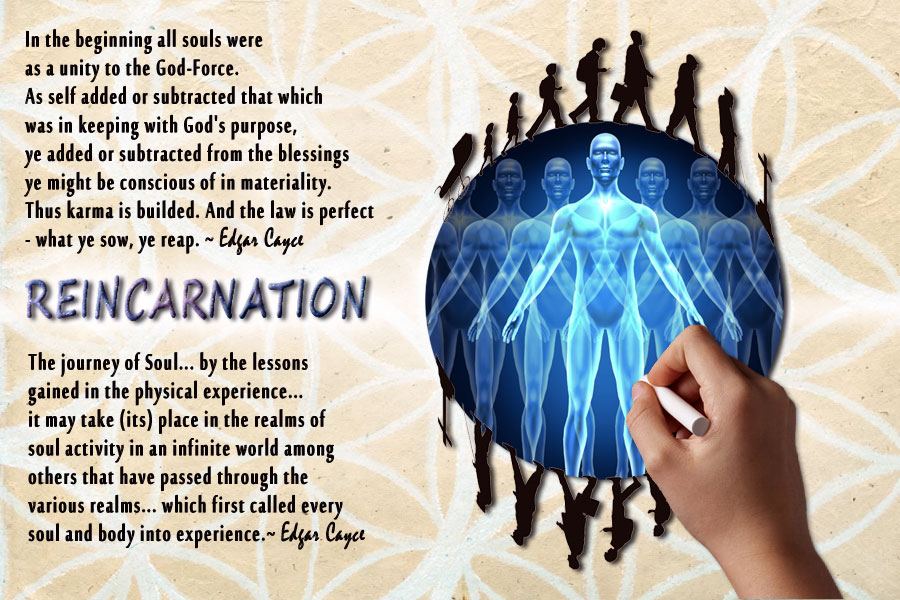Tracing The Rules Of Reincarnation
 by Robert C. Smith
by Robert C. Smith
We may have hunches about past lives. We may have theories about experiences in another time or place. Some of us may even have vivid past life dreams or flashes of waking recall. But what do such experiences really mean? Can they teach us anything about ourselves and how to live this life more fully? Unless we can answer yes to these questions, the study of past lives may be nothing more than an interesting past time, an indulgence of curiosity about ourselves that has little practical value.
But suppose, on the other hand, that the study of past lives is actually a look into the inner workings of the universe we live in, a glimpse into the purpose and orderliness of life. If this is so, then this investigation is a very important avenue to the answer to two of the most important questions mankind has ever asked: Why is life the way it is, and why am I the way I am?
Through the study of past lives, we can gain insight into how life works, how to make the most of our positive traits and talents, how to meet the obstacles life seems to throw in our way, and how to overcome our faults and weaknesses.
Throughout this course, you’ll be approaching past lives from two sides. From the first angle, you’ll be using past life theories to help you understand the way life works. And coming at it from the opposite side, you’ll be using that understanding of the way life works, or the rules of reincarnation, to develop theories about your own past lives and about the experiences you may have had in any lifetime. Your understanding of the rules governing the reincarnation process will be a very important foundation, then. It will become the framework that makes sense out of the past life clues that you’ll gather as you go through the exercises of past life analysis.
Just what are the rules that govern the soul’s movement from life experience to life experience? We’ll be looking at these on two levels: the basic rules or premises that describe the reincarnation process, and the specific rules that influence the particular experiences we have from lifetime to lifetime.
First, then, let’s examine the basic premises. Anyone who has tried the reincarnation theory on for size has encountered the basics. In a nutshell, it suggests that life is eternal, purposeful, and orderly; and that we have experienced and will continue to experience life as human beings many times. The very fact that you are working on how to understand remembering past lives suggests that this philosophy appeals to you or rings true in some way.
Let’s take a look at some of the things that reincarnation implies. When we say that life is eternal and that we have lived before in other human bodies, we’re really saying that who we are is nonphysical. We might call our true self the soul. The soul goes through many experiences, each one having its impact, leaving its mark on our identity. The person you are today is the sum total of all the experiences you’ve ever had. Therefore, the person you are today is helping to shape the person you will be in the future, both later on in this life and in future incarnations.
Possibly the most attractive aspect of the reincarnation theory is its emphasis on free will. Free will is supreme in the reincarnation scheme of things. In one sense, we could even say that the purpose of life—of all our lives—is to grow to our highest potential by learning to make the best choices as we go through daily experience. With the people and circumstances that come into our lives, we have the opportunity to learn love, to develop talents and abilities, to grow in understanding—in short, to become all that we, as children of God, are capable of being.
Now, of course, choices build on one another, with a choice leading to a circumstance, and that circumstance leading to another choice. The resulting chain of choices makes our life what it is at any given moment. Because we can’t change our circumstances instantaneously, we sometimes mistakenly think we’re not free.
Suppose you have spent your whole life developing the ability to play tennis. You’ve made choices about taking lessons, spending time in practice, maybe even selecting as friends people who share your interest in sports. It would be unrealistic to expect that you could make a sudden choice to oil paint instead and instantly produce a masterpiece. But you could decide to start working on developing your artistic skills and so start building a whole new chain of choices. Similarly, it would be foolish to say that you were predestined to be a tennis player instead of a painter, knowing that you yourself had made decisions much earlier that set your life along an athletic direction.
It works the same way with reincarnation and free will, except that the time span is usually longer. You may have made choices in other lives that you don’t even remember. But it will be these choices, and not fate, that determine the family you are born into, the circumstances you meet in life, the talents and traits that you possess.
This process of making choices and then experiencing the results of those choices is really what karma is all about. Karma is the operation of the law of cause and effect. As such, it is the main dynamic around which your experience from life to life turns. And let’s get one thing very clear at the outset: Karma is not punishment for misdeeds, it’s not the merciless judge and jury that sentences us for every failing, nor is it a mysterious force that come along and knocks us down because of some long forgotten sin.
Karma is simply the law of cause and effect in action. It suggests that everything we think, everything we do and say—constructive or destructive—is a cause that will in due time have its effect. As we sow, so shall we reap. We alone determine whether our karma is pleasant or unpleasant.
Let’s take a closer look at how this works. In doing so, we will be moving from our discussion of basic premises behind reincarnation into an examination of the specific rules by which it is governed.
There are several ways that we experience cause and effect. The first aspect of karma has to do with the simple rule that no effort is ever lost; the effect of the effort continues. This means that the things we learn, the talents we work to develop, and the efforts we make at getting along with other people all carry a certain momentum. Until some situation arises in which we choose to change them, we will continue to carry over personality traits, talents, interests, and attitudes. So we might call the first rule the Law of Continuation.
There is a second way in which we experience karma. Because our purpose in reincarnating is to grow and learn from our mistakes, we must sometimes experience the results of our poor or destructive choices. This is the only way we get to learn firsthand that certain actions and thoughts are not conducive to our growth. Just as even the most loving parent must at times allow a child to make a mistake in order to learn from it, our God-Self allows us to make mistakes and experience the consequences. This God-Self does not punish us when we treat other people unkindly, do something dishonest, or misuse the resources that have been put at our disposal. But under the law of cause and effect, those actions must bring certain consequences that will help us learn not to repeat our mistakes. Let’s call the second rule the Law of Consequences.
At times we can experience the consequences of our past mistakes very directly. This is like the eye-for-an-eye, tooth-for-a-tooth law of the Old Testament and many ancient cultures. For example, one young woman who had a reading from Edgar Cayce was told that the repeated disappointments she was experiencing in her love life were the direct result of an earlier incarnation in which she had discouraged many suitors by not keeping her word to them. The Law of Consequences can bring conditions into our lives that help us to see what it’s like to be on the other side of the fence.
Sometimes physical harm done to others may result in physical consequences. One example is the case of a blind man who was told by Edgar Cayce that he had blinded others with hot pokers in an earlier incarnation in Persia. A word of caution here, though. We can never look at another person’s handicap or unfortunate circumstances and assume that he or she is paying for some past misdeed. In fact, there are always so many possible past life scenarios behind a person’s situation that we can never judge from the outside what the actual cause may be. What’s important is that we gain a sense in our own lives of why we experience the things we do.
The Law of Consequences also brings us the results of the constructive choices we make. For example, the person with the good and happy home may have done much to create a home for the homeless in another life. The person with the ability to make friends easily may have continually offered comfort and encouragement to those around him during a prior incarnation. The person with a healthy body may have nursed others in a previous experience.
Sometimes the consequences of our choices can be somewhat less direct, or even symbolic, in the form they take. Consider, for example, the woman who repeatedly found herself drawn toward, yet resentful of, people in authority. Her Cayce reading told her that this was the result of a lifetime when she had been a lady-in-waiting to a queen. Or take the case of the man who had in an earlier lifetime in Egypt worked on building communications with people of many languages and cultures in order to do business with them. He was told that in this lifetime he could make money investing in airlines. We can see how in the modern age air travel brought the rewards of what this man had tried to do in his earlier Egyptian incarnation.
There is one more law we can trace through the development of souls from lifetime to lifetime—the Law of Compensation. According to this law, we all go through multi-faceted experiences in order to become balanced, well-rounded individuals. In keeping with this rule, we may incarnate into many races and religions. In order to become balanced, we may have to experience opposite extremes from time to time. This apparently happens with our sexual identity, for example. During our countless lifetimes on the earth, most of us have incarnated in the bodies of both sexes in order to incorporate into our identity the best traits of each sex. Other polar opposites—such as meekness and courage, intellectual and physical development, an outgoing nature, and an introspective one—may each be experienced in turn to round out the character.
Before going on to see how these rules can be traced in patterns described in the Cayce life readings, let’s list and briefly summarize each one. This will provide you with a quick review and easy reference.
The Law of Continuation: Personality traits, talents, interests, and abilities tend to continue from lifetime to lifetime until some situation arises in which we choose to change them.
The Law of Consequences: We experience the consequences of our choices. Constructive choices bring positive consequences, and destructive choices bring negative ones that will teach us not to repeat our mistakes.
The Law of Compensation: In order to balance personal traits, we may experience opposite extremes—such as masculinity and femininity—from lifetime to lifetime.
Now let’s take a look at a few case histories. In each instance, the person’s past life experience is described, along with his or her current circumstances. It’s up to you to determine which rule is in operation. Answers are given following the last case, number 7.
Don’t think of this as a test; it’s merely a tool to aid in your comprehension. It’s not necessary for you to write your answers or count up your total score of correct responses. What is important is that you consider each case carefully, note any that you misidentify and reach an understanding of how these principles actually work.
Case 1: This man was an Italian living in America. His life reading said that he had been an early Italian explorer at the time of Columbus and had been drawn to the Americas to become involved in various associations with other people. He was now back in North America, apparently reexperiencing some of those associations in his business dealings. What law might you say predominates in this story?
Case 2: This woman was told that she had been of the tribe of Mound Builders in North America in a previous incarnation and that her biggest contribution to the general welfare during that lifetime had been in assisting people to build their individual homes. During her modern lifetime, her home—preferably in a natural or rural setting, as opposed to a city—would be of central importance. Which law do you feel is at work here?
Case 3: Here we have the story of a young girl who had lived in England just after the Holy Wars. She had become a religious recluse, using her hands to labor very hard in a convent. In her current lifetime, her hands showed remarkable physical beauty and she had the ability to create beautiful things with them. What law might be in operation here?
Case 4: This man had been an executioner during the French Revolution. His reading said that even during that life he had hated himself for his role. In his modern day lifetime, he hated persecution of all kinds and was even sensitive to the destructiveness of fault finding. What law do we see here?
Case 5: Again we have a man, this time one who had lived after the destruction of Atlantis. He had been a leader who led a group of survivor-refugees into a new land and settled it. His one failing was in sexual excess, which apparently made him many enemies among the people who inhabited the land he settled. In his current lifetime, he was sterile. What law do you see operating here?
Case 6: This woman was told of a lifetime as a Greek athlete. Today she had great admiration, to the point of worship, for the ideal body form. Which law is at work here?
Case 7: Finally, there’s the case of the woman who at times had the sensation of choking physically and found it hard to catch her breath. When she asked about this in her reading, she was told that in an earlier life she had choked back her emotions. What law might we see here?
Answer 1: This seems to be a case of continuation. We see the man repeating his Italian nationality and once again being drawn to the Americas. We see him almost picking up where he left off in the earlier lifetime.
Answer 2: Here again, continuation is the most straight-forward explanation. The thing that the woman valued so highly continued to be of value for her. We might even read in a little of the Law of Consequences here and imagine that she would have had a particularly pleasant home because of what she had done for others in the earlier experience.
Answer 3: Here we see a case where the Law of Consequences brought this soul the results of its labors in an earlier life. The beautiful hands were a symbolic representation of the way she had used her hands to live out her faith. And her ability to create with her hands was a direct and practical consequence of the effort she had put in earlier.
Answer 4: This is probably a case of compensation. After having experienced the extreme as an executioner, this man was balancing himself by avoiding all contact with persecution and fault finding.
This case is particularly interesting because it is not necessarily what we might expect to be the karma of a former executioner. We may see the man’s apparently mild karma from several different perspectives. On the one hand, the fact that even during the French incarnation he had realized that what he did was wrong and had come to regret it so deeply may have eliminated the need for him to experience a more traumatic consequence of his deeds. On the other hand, he may have learned his lesson in some other lifetime before the current one. His reading indicates that later on in the French lifetime itself he fell victim to the counter-rebellion, and so he may have experienced at that time the direct consequences of his destructive actions.
Answer 5: This might be either the Law of Consequences or the Law of Compensation. We’re not told in the reading exactly why his excesses caused problems with the native people. If he broke their moral laws or social customs, we might see his current sterility as a symbolic payment for his misdeeds. Perhaps he fathered many children who were not properly cared for. In that case, we might see his sterility as compensation—one extreme balancing out another.
Answer 6: Here we have a clear and simple case of continuation, in which the attitudes and traits of the past continue to be a part of the individual character.
Answer 7: This is the Law of Consequences, with a symbolic twist to it.
From these examples, it’s easy to see how the things we like and don’t like in the present, the talents we do and do not have, and the relationships that go smoothly and the ones that are difficult can all be clues to understanding our past lives. We have also seen, as these rules operate, that what we have sown in another life we are reaping now, what we gave then we are gaining now, what we did to others then is being done to us now, and what we were then we are meeting in others now.
Karma can therefore be blessings, or it can be problems which subtract from our blessings. It is a perfect system of justice, in which each one of us, certainly and inevitably, faces or experiences in some form what we have done—both good and bad—to others.
Understanding these karmic rules also raises some questions: How can we use our credits to the best advantage? What can we do about the past failures? How do we keep from making the same mistakes over and over again? How much do we have to face?
You are familiar with the fact that more than one rule can be in operation at the same time. For example, the laws of aerodynamics overcome the law of gravity, and planes take off from runways daily. Gravity is not annulled, but it is counteracted by another law. Or perhaps as a child you filled a bucket with water and swung it full circle without spilling a drop. Centrifugal force overcame the law of gravity.
Just so, the Cayce readings say that the law of grace will counterbalance karma and that we can choose to live under the law of grace. What exactly is this law of grace? Simply stated, it is the Golden Rule: Do unto others as you would have others do unto you. As we apply the Golden Rule in our dealings with others, we move from karma to grace. In other words, we live under the law of grace to the extent that we treat others according to the Golden Rule.
Excerpt from You Can Remember Your Past Lives
Posted in Other Topics, Past Life Therapy, Reincarnationwith comments disabled.





